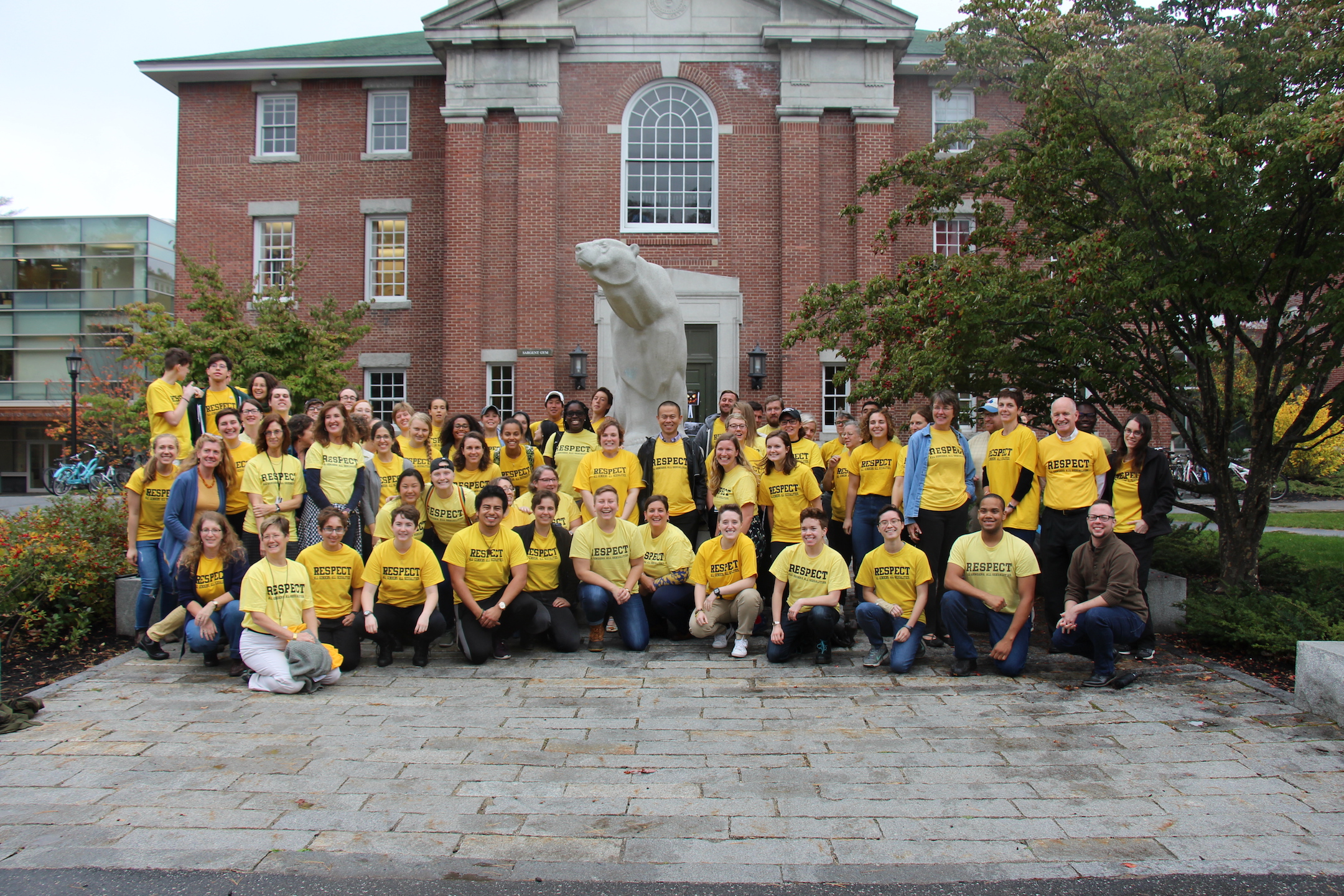Yellow Shirt Day continues tradition of recognition
October 27, 2017
On Tuesday, hundreds of students, faculty and staff donned yellow shirts that read “Respect. All genders. All sexualities,” for Bowdoin Queer-Straight Alliance’s (BQSA) seventh Yellow Shirt Day. A part of programming for OUTtober, the event is hosted annually near National Coming Out Day in order to show solidarity for the LGBTQ+ community at the College.
Yellow Shirt Day originated in 2005, when a protest was organized against an outside speaker, Michael Heath, who wanted to overturn Maine’s sexual orientation anti-discrimination law. He was brought to campus by the College Republicans. The protest asked students to show up to his talk wearing yellow as a sign of opposition.
 Mindy Leder
Mindy Leder
Since then, the text on the yellow shirts has cycled through various iterations. The first one that read “Gay? Fine by Me” sparked controversy for its exclusive message. In an Op-Ed for the Orient in 2010, J. Pasch ’11 expressed concerns that the shirts did not empower non-straight students, marginalizing LGBTQ+ identities other than “gay.” Moreover, Pasch added, this message on the shirts was “problematic,” for it “encourage[s] Bowdoin students to pat themselves on the backs for being ‘tolerant’ of gay students by merely wearing a yellow shirt.”
“The slogan allows our value as queer individuals to be determined—and affirmed—by those who reap the benefit of the very heterosexual privilege we wish to eliminate, thereby sustaining such privilege rather than challenging it,” Pasch wrote.
For the second annual Yellow Shirt Day, the shirts were redesigned with their current slogan, “Respect. All Genders. All Sexualities.”
“It’s not about the referendum at this point. It’s not about the speaker. It is a way of sending a message of what we believe in and respect on this campus,” said Kate Stern, associate dean of students for diversity and inclusion and co-director of the Center for Sexuality, Women and Gender.
BQSA leader Sophie Sadovnikoff ’19 said the goal of the event is not only to show solidarity, but to also spark conversation surrounding issues in LGBTQ+ communities.
“I like to think of it as a first step or a foot in the door. My goal with Yellow Shirt Day is not only to get [people] participating but to get people talking and sort of thinking about the queer community on campus and what that experience is like and why we have the need for Yellow Shirt Day in the first place,” said Sadovnikoff.
The event is intended for the campus as a whole, however, BQSA has struggled with publicity and outreach in the past.
“Outreach and publicity still could’ve been better,” said Sadovnikoff. “I know a lot of people who knew it was happening sometime in October, but not the exact day, and forgot to wear their shirts on the actual day.”
The event was publicized through posters and through the groups that BQSA works with to order shirts. The Student Activities Funding Committee (SAFC) does not provide the funds for Yellow Shirt Day, so BQSA partners with other groups that supplement the finances. The Department of Athletics is BQSA’s primary partner.
The athletics department orders most of the shirts, accounting for around 238 of a total of 357, which is why some have remarked that the event feels exclusive to athletes.
According to Associate Director of Athletics Alice Wiercinski, in 2011, then Director of Student Activities Allen Delong reached out to the the athletics department about getting involved in the annual event. Under the leadership of Ashmead White Director of Athletics Tim Ryan and Wiercinski, the partnership has continued and developed over the past few years. The department continues to support the overarching positive message of Yellow Shirt Day.
“The intent of [the partnership] is to just continue to have a supportive environment, from an athletics perspective, for student-athletes and to continue to promote and grow inclusivity within our athletic programs as well as on campus in general,” said Wiercinski.
This year BQSA tried to expand its audience by reaching out to professors through Queers and Allies, the faculty equivalent of BQSA, and through departments.
“We started with what had been done in the past, and from there tried to think of large groups of people we could reach out and those who could be interested in actively showing allyship,” said Finny Doherty ’20, treasurer of BQSA. “If you see a wide range of people—who you may or may not know—wearing yellow shirts, then it’s a lot more comforting and empowering.”
However, in spite of their efforts, expansion to groups outside of athletics has proven difficult since the department has a strong infrastructure in place to reach out to students, according to Sadovnikoff.
“I think every year on Yellow Shirt Day we wonder if this is the best way to do this,” said Sadovnikoff. “I think we continue a lot out of tradition and the desire to have an event people get involved in very easily and that can make a broad, if shallow, impact that a lot of campus community joins in.”

Comments
Before submitting a comment, please review our comment policy. Some key points from the policy: